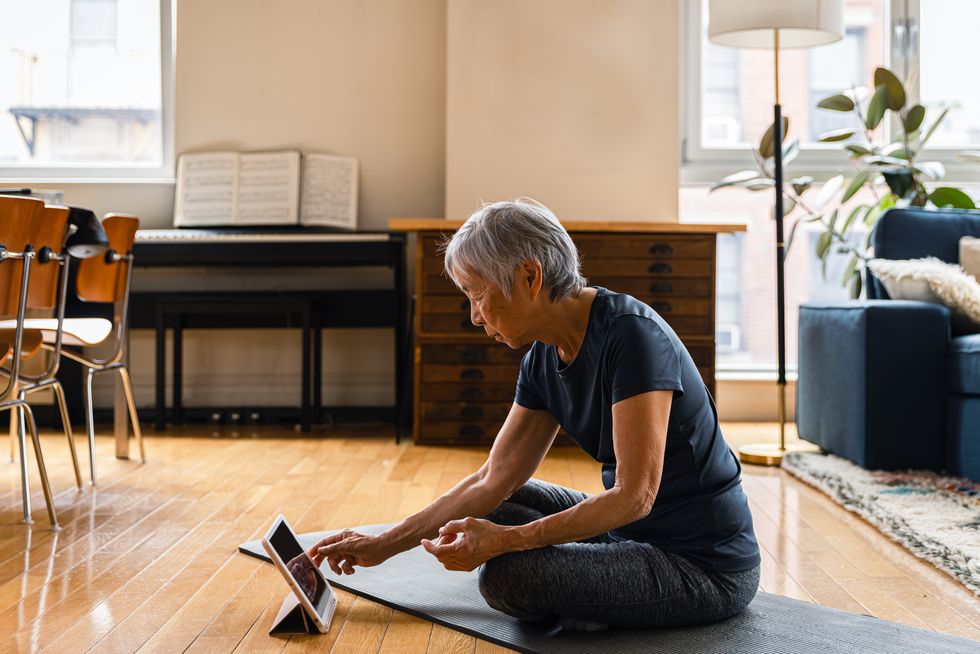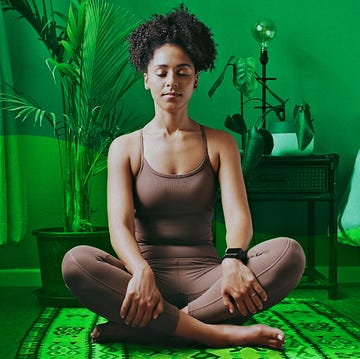Caring for our mental health is more essential than ever before. The way we treat our bodies, how and with whom we spend our time, and what thoughts take center stage in our minds are vital. In the monthly Shondaland series A Path to Well-Being, we’re sharing science and strategies to help you better understand and manage your well-being.
One of the most perennially popular New Year’s resolutions is to exercise more. And while people resolving to log more gym time might be thinking about shaping their biceps or booty, their brain may be the biggest beneficiary of increased physical activity.
Exercise is one of the best things we can do for our brain and mental health. It doesn’t matter what activity you choose — housecleaning or hiking, weight lifting or water aerobics, a living-room dance party or killer CrossFit class — any movement that gets the blood flowing brings mental health benefits, according to Lauren Turner, a therapist who specializes in working with athletes.
“Even taking a walk around the block can create a sense of energy moving throughout the body in just a few minutes,” Turner says. “For people who think they have to be in the gym for a two-hour class, you don’t have to do that to start benefiting from small changes in your mental health.”
Studies show that exercise reduces stress and anxiety, lifts mood, increases self-esteem, boosts cognitive function, and improves sleep. Exercise also reduces inflammation and improves vagal tone.
The human body was made to move, and all its systems work better when it does, says Andreas Michaelides, chief of psychology for Noom and a contributor to the new book The Noom Mindset. The benefits of exercise go way beyond weight and physical appearance. “It’s really not about changing your body,” he says. “It’s about feeding your mind.”
Physical activity affects brain chemistry, triggering the release of feel-good neurotransmitters such as dopamine and serotonin and reducing stress hormones, including cortisol. The result is a calmer, happier, more easygoing you.
Every little bit of movement counts. Turner often incorporates a few minutes of chair yoga into her sessions with clients. She says that even a brief stretch and a few deep breaths leave them feeling more relaxed and allow “their brain to start operating at a new level.”
Physical activity oxygenates the blood, which is calming to the nervous system and releases the energy associated with the fight-or-flight state of stress. If you’re ready to give your brain a boost by bringing more movement into your life, try these expert tips:
Make it fun
It’s important to not only choose exercise that you enjoy but to also separate the idea of exercise from any kind of achievement or result. When movement isn’t about weight loss or six-pack abs, Michaelides says the activity can become its own reward. He suggests making a list of sports and activities that sound appealing and approaching them in a spirit of experimentation.
“Ultimately, what you end up doing or what ends up feeling good is going to be a byproduct of things that you experiment with,” Michaelides suggests, “and if you take this experimentation mindset, you’re less likely to feel something failed and call it quits.”
Your list might include a neighborhood walk, tap-dancing lessons, a karate class, a softball league, cross-country skate skiing, or anything else that reasonably piques your curiosity. After you jot them down, systematically take on the activities on your list and see what you like. As long as you’re moving, you win. And — bonus! — you could discover a sport you love and find a new community to join.
Be absorbed
Getting into the flow with a dance class, virtual-reality fitness game, round of boxing, or pickup basketball game is a great way to experience the joy of movement and is a powerful stress relief. When objects are flying at you in a video game, blows are being thrown in a boxing class, or a pass is headed your way in basketball, you have to pay attention. There’s no time to ruminate over deadlines, to-dos, or that weird thing your sister said.
Turner urged her attorney husband to spend some time on his lunch hour shooting hoops — especially on days packed with challenging cases — and for the 30 minutes while he’s playing, he doesn’t think of anything else, which gives his brain a much-needed break.
Add it up
If it’s been a while since you’ve exercised, set yourself up for success by starting small, Michaelides says. Remember: It doesn’t take much movement to bring on a mood boost. Research shows that as little as 30 minutes of exercise three to five days a week is enough to improve mental health — and those 30 minutes can be cumulative throughout the day, so a 15-minute walk on your lunch break and a 15-minute walk after dinner have you covered.
Turner suggests looking at your routine and seeing places where you can fit bits of movement into your day as your schedule allows. Can you do a walking work meeting by phone instead of over Zoom? Can you park farther away from the grocery store? How about taking the stairs instead of the elevator? “You don’t have to like exercise,” she says, “to be able to add small things that can help make those improvements and changes in your life.”
Set SMART goals
Both Michaelides and Turner recommend making your movement goals SMART, an acronym for goal-setting guidelines that inspire more likely achievement. SMART stands for specific, measurable, attainable, realistic, and time-bound.
Instead of resolving to simply exercise more — whatever that means — measure yourself more granularly. Maybe you decide to take a 10-minute walk three days a week during the month of January. Being clear about your intentions and making your plans super-specific will make you more likely to follow through. And keeping your word to yourself always feels good.
Sandy Cohen is a Southern California-based writer, health and wellness coach, and host of the Inner Peace to Go podcast. Follow her on Twitter @YouKnowSandy.
Get Shondaland directly in your inbox: SUBSCRIBE TODAY

















